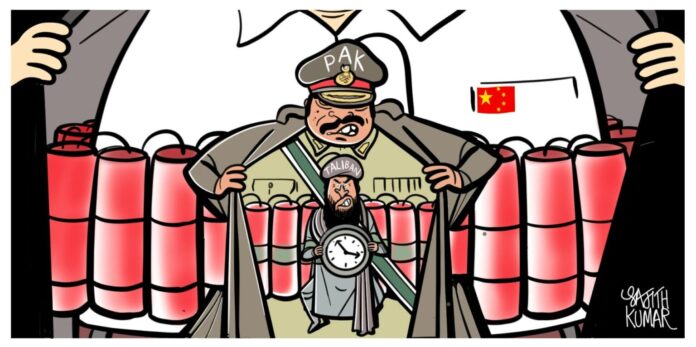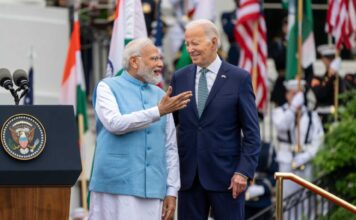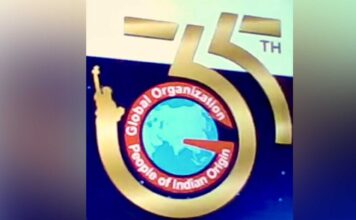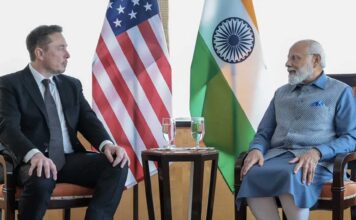Any government effort towards re-building Afghanistan will antagonize Pakistan
By K.S. Tomar
Notwithstanding, the denial by the United States and Pakistan, both acted in tandem which gave Joe Biden his “Obama Moment,” rejoicing the success of the hellfire attack on Ayman al Zawahiri, Chief of Al-Qaeda.
A week after the death of Al Qaeda chief Ayman al-Zawahiri in Kabul, the banned Tehreek-e-Taliban Pakistan’s (TTP) top leader Omar Khalid Khorasani and three other top terrorist leaders were killed in a mysterious explosion in eastern Afghanistan’s Paktika province.
The killing of Zawahiri was almost a repeat of May 2, 2011, when former US president Barack Obama won the hearts of Americans by eliminating Osama Bin Laden, the founder of Al-Qaida at Abbottabad next to the Pak army complex. It will remain a highlight of the otherwise lackluster tenure of the Biden presidency, so far.
Pakistan is a deep economic mess due to burgeoning debt over unsustainable projects like the China-Pakistan Economic Corridor (CPEC), loans and interest burden from foreign countries especially China, and overcharging of electricity prices by Chinese electricity generation projects affecting the economy as a whole.
Army Chief General Qamar Javed Bajwa, who is very close to Shehbaz Sharif’s government, is leaving no stone unturned to wriggle out of the financial mess including directly approaching the US government for help.
Foreign policy analysts opine that Pakistan might have adopted a four-pronged strategy which included assuring the US role to get a $7 billion IMF loan, earning a bounty of $25 million on the head of Zawahiri, liberation from the stigma of the Grey List of FATF, and teaching Taliban a lesson for creating problems on Durand line of control. Pakistan had reportedly provided intelligence input which helped the US to undertake a hellfire missile strike with perfect precision thereby eliminating the target and harming none of the family members or civilians.
Not about Afghanistan but Pakistan
The US, somehow, managed to get out of the ‘graveyard of empires’ called Afghanistan after twenty years of a fight that benefitted none but Pakistan. Still, the last remaining perpetrator of the 9/11 attack – Ayman al-Zawahiri, a doctor turned career terrorist, remained the top US target to be eliminated for the sake of the domestic audience.
Though the killing of Zawahiri also put the Taliban regime in the dock for violation of the Doha agreement. Though, Pashtunwali – A traditional Tribal code in Afghanistan protected “the guest”. They had a precedent before them as Mullah Omar had also refused to give up Osama bin Laden in wake of the 9/11 attack.
Once tutelage of Inter-Services Intelligence (ISI), the Haqqani network is feeling caught between the cleft. On the one hand, Sirajuddin Haqqani is holding the post of the interior minister in the Taliban 2.0 but there is turbulence in Khyber Pakhtunkhwa on the other hand against Pakistan, where a resurgent Tehrik-i-Taliban Pakistan commonly known as the Pakistani Taliban is vowing to impose Sharia law in Pakistan.
So, Pakistan needed to give a strong message to Kabul while proving its worth to the US that it is still ‘most worthy of the allies’ in the so-called global war against terror. All fingers are pointed towards Islamabad while elites in Pakistan see it as a much-needed action against the ‘poison ivy’ affecting the society severally.
The fact is that the precision of the US hit on Zawahiri was not possible without impeccable intelligence which only the Pak network could provide to the US. Taliban was quick to quote the Islamic law saying, “To take a human life without due process of law is a serious violation in the worldview of Islam.”
Who gains, who loses?
“Justice has been done and America will get after any terrorists who will try to harm his countrymen,” Biden said declaring the killing of al-Zawahiri to the world.
After Zawahiri, the US no longer has any direct interest in Afghanistan. The US and its allies have frozen Afghanistan’s $9 billion in foreign reserves, stopped foreign assistance, and imposed sanctions on the Taliban regime which may continue.
But Pakistan is all set to gain from what the Taliban is seeing as a ‘deceit’.
Pakistan is expected to get a $7 billion financial IMF bailout package, a healthy dose of US arms, and assurances that will carry it for a few months more. The US seems to be satisfied with Pak’s role hence IMF loan is now a certainty.
Impact on Afghanistan
Taliban’s efforts to sell its image as a reformed group may change overnight as the world is finding it extremely difficult to believe that they will not permit its soil for terrorists’ activities especially when the mastermind of the 9/11 attack was residing in the city and shelter was provided by the regime.
In this background, drone strike and the killing of Zawahiri by the US has put these Taliban-friendly nations in the dock as it will be extremely difficult for them to lobby for international recognition of a regime that still harbors the terrorists.
Experts say that Al Qaeda now faces a serious crisis of leadership and succession due to its dwindling power and shaky future. The rivalries had surfaced after the killing of Osama bin Laden which pertained to several extremists’ rival groups and their presence was found in Afghanistan also.
As per indications, Saif al-Adl, Egyptian, is one of the aspirants who is dreaded by the West while keeping in view his experience, revered status within Al Qaeda, and the potential of his charisma to draw back Al Qaeda defectors who’ve moved to other groups. The Taliban regime might remain cautious in encouraging any leader as it stands exposed.
A ‘Red’ Taliban?
It is an open secret that Pakistan had played proactive roles in harboring the Taliban and later in the formation of the new government. Former ISI chief Faiz Hammed had boasted of having tea with new Taliban leaders in a hotel in Kabul. But gradually differences have cropped up with Pakistan over fencing though both sides have not crossed the limit so far.
Pakistan had celebrated the Taliban’s return and China did not lag behind in supporting the effort. China was eying multi-billion dollar mineral wealth and hence went the extra mile to have warm relations with the Taliban. The flurry of activities going on to fast track the Peshawar-Kabul route under CPEC is being touted as China’s contribution to rebuilding Afghanistan while the Pak economy cracks under the burden of the loan repayment under the same project.
The Afghan people, historically, are known for their fiercely independent streak. They rose against ‘communism’ and the mighty USSR. What ‘global jihad’ essentially did in Afghanistan was to destroy the social fabric and local institutions resulting in the rise of Pak propagated religious extremist Taliban.
Now a generation later, with ‘communist’ China trying to make inroads in Afghanistan, Pashtuns are unlikely to accept the exploitation of their country and its natural resources. But Pakistan remains an important factor in all geopolitical equations related to Afghanistan as it looks for its own ‘strategic depth’ to barge over its insecurities.
A landlocked country at the crossroad between Asia and the Middle East, Afghanistan has always been a frontier in history, and it will continue to remain so, even in the 21st century.
(The writer is a senior journalist based in Shimla, India)













